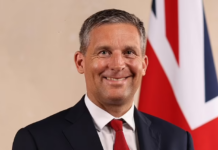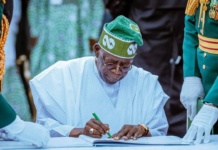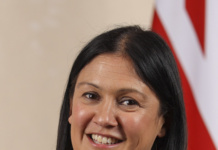By Peter Olorunnisomo – Contemporary notions and concepts are not readily kind to military intervention in governance. But against the back-drop of situations on the African turf, it would appear that innovative avenues of intervention are helping to find a more relevant role for the military aside from protecting the sovereign territories and integrity of a nation as a traditional function.
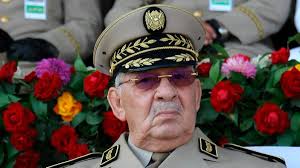
General Constantino Chiwenga’s ‘intervention’ in 2017 in Zimbabwe would challenge the definition of a coup d’etat as it did not meet the ‘alarm’ criteria for it so defined and condemned. Indeed the world was silent expecting what they did not get preparatory to a round condemnation that lay still, undeliverable.
The role of the army, in Africa, is shifting to show a consciousness to political responsibility when the peoples’ mandates and votes can be readily undermined.
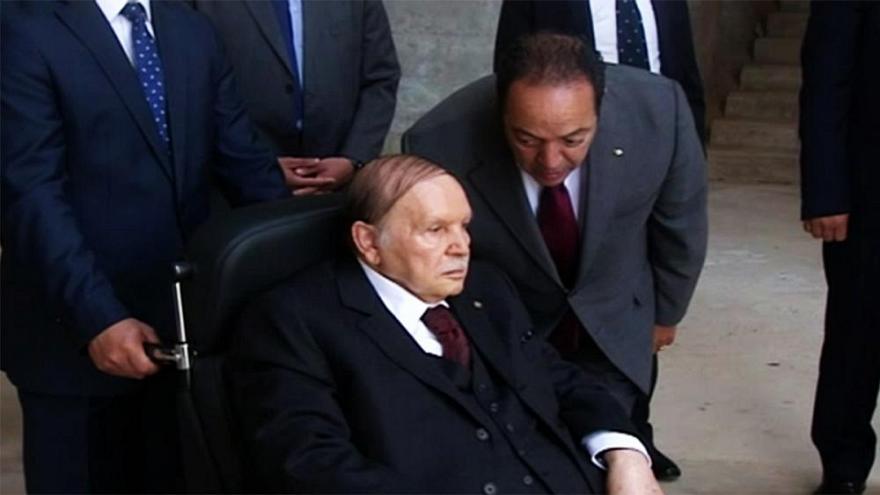
Gaid Salah, an Algerian army chief made the news with a public demand on electronic media that the presidency should be declared vacant the latest move in efforts to get ailing president Abdul Aziz Bouteflika to leave office.
A common feature of military takeover is the announcement, then the context of treason quickly establishes itself if the coup fails. Where it succeeds, the country experiences a new regime of totalitarian rule. But Chief of Staff, Salah, called for the application of article 102 of the constitution which stipulates that a president can be removed from office if he is unable to execute his duties.
Based on the constitution’s Article 102, the chairman of parliament’s upper house, Abdelkader Bensalah, would serve as caretaker president for at least 45 days after Bouteflika’s departure.
Salah’s address was carried by the El-Bilad TV netwrok as he addressed top military officers. Political watchers hold that it could be the main reason that Bouteflika could be forced to resign.
“The solution that must be adopted to end the crisis and answer the legitimate demands of the Algerian people is the solution that guarantees the sovereignty of the constitution and the continuity of the state,” Gaid Salah stressed.
President Abdelaziz Bouteflika has been in power since 1999, when he won elections unopposed, after all six of his rivals withdrew from the race, citing fraud and intimidation.
Over the 20 years of his reign, Bouteflika has won three elections, implemented several reforms and enjoyed the backing of the army to help him govern the country.
Bouteflika suffered a stroke in 2013, that has left him physically unable to address the nation, only speaking to Algerians through letters.
The north African country has for months now been riled by anti-government protests demanding the immediate resignation of Bouteflika at a time he was preparing to contest in April polls.
Under mounting pressure, the president announced earlier this month that he was not going to contest a controversial fifth term but that he was going to remain in charge till his successor was chosen. The move was meant to quell weeks of anti-government protests.
Naming a new prime minister and government, Bouteflika also postponed the April 18 presidential elections. No new date was given.
Algeria’s biggest union and an influential party on Wednesday backed the army call for President Abdelaziz Bouteflika to quit in a managed exit plan was quickly rejected by protesters demanding the overthrow of the entire political elite.
The statement from the National Rally for Democracy (RND), a member of the ruling coalition, came a day after the military – Algeria’s traditional kingmakers – said Bouteflika should be declared unfit for office.
The General Union of Algerian Workers (UGTA), long a staunch supporter of the president, also said it supported the army call for Bouteflika to step down.
The announcements by three pillars of the establishment were a clear signal that the 82-year-old president – who has rarely appeared in public since suffering a stroke in 2013 – has little to no chance of staying in power. .
The army has been patiently waiting for the right moment to intervene, after winning over Bouteflika’s allies in a process that has emptied out his inner circle, in the hopes of a smooth transition period, political sources said.
Protesters have repeatedly said they would reject any orchestrated succession in politics and want a transition which will lead to a government by consensus.
“We want a real democracy not a facade of a democracy,” said postal worker Zakaria Jaziri 26.
“We welcome the army’s initiative but we do not want Bouteflika’s men to govern us until the next election,” said state bank employee Djamel Hadidi, 37.
The clear note is the peoples’ backing for the army as an initiator of concern and an intervention with public interest.
Speaking at a news conference in Moscow with Russian Foreign Minister Sergei Lavrov, Ramtane Lamamra said the Algerian government had responded to the legitimate demands of the Algerian people.
Most independent groups refused to join efforts at formation of a new government in spite of the new prime minister, Noureddine Bedoui’s role. The reason being that they wanted to stand by the people and want nothing to do with the government.
Not even promises of electoral and political reforms would convince the adamant protesters. Political watchers hold that the latest development whiles being significant awaits the response of protest movements.
The leader of Algeria’s ruling coalition partner RND party, Ahmed Ouyahia, on Wednesday urged President Abdelaziz Bouteflika to resign.
“The Democratic National Rally recommends the resignation of President Abdelaziz Bouteflika according to the fourth paragraph of the article 102 of the constitution,” a statement from the party said.
“The implementation of the article 102 (of the constitution) means that the symbols of the system will oversee the transition period and organise presidential elections,” Mustapha Bouchachi, a lawyer and activist, who is one of the leaders of protesters told Reuters.
“Protests will continue… Algerians’ demands include a change of the political system,” Bouchachi added.
Protesters have repeatedly said they would reject any orchestrated succession or military interference in politics and want a transition which will lead to a government by consensus.
Algeria is regarded by Western states as a partner in counter-terrorism, a significant military force in North Africa and a key diplomatic player in efforts to resolve crises in neighbouring Mali and Libya.
Any outright military rejection of demands for a democratic transition could deepen the biggest political crisis since 1992, when generals cancelled an election that Islamists were poised to win, triggering a civil war that killed 200,000 people.
Very clearly, the challenge of accepting septuagenarians and octogenarian leaderships in Africa has often conflicted with the need to get them to be at their best in terms of performing their roles. More importantly is the level of their patriotism becomes severely challenged when, from past policies and activities, they have done little or nothing to consolidate the patriotic intent of their services.
A governance strategy would imply the ability to manage talents across the technical and bureaucratic sphere is key to good administration. The understanding of politico-economic visions is crucial to development and the most significantly, the skill to navigate the currents of international political waters to national advantage has been critical and a challenge to the continent with an influence of political subterfuge. But these also wane with age. Can Bouteflika then still dance?
This is clearly not a coup but a new role for the military which must prove its support for the people’s will and define the national interest.
Kindly follow us on twitter:@AfricanVoice2


